Usually tech conferences are hosted by huge corporations, looking to congratulate themselves and center bottom line profits. At Take Back Tech, on the other hand, we strengthened our collective courage and the strategies needed in the fight against Big Tech. It was an incredibly diverse space of organizers, students, tech workers, teachers, local representatives, lawyers, professors, engineers, authors, and researchers.
Take Back Tech 2024 is our second convening for organizers, advocates, academics, and workers who are looking for a space to deepen the connections and strategies we’ll need to combat technology’s worst harms. In 2019, we held the first Take Back Tech in San Jose, CA to facilitate conversations around freeing our futures from surveillance and state violence. We believe broad movement organizing will expose and derail the tech industry’s efforts.
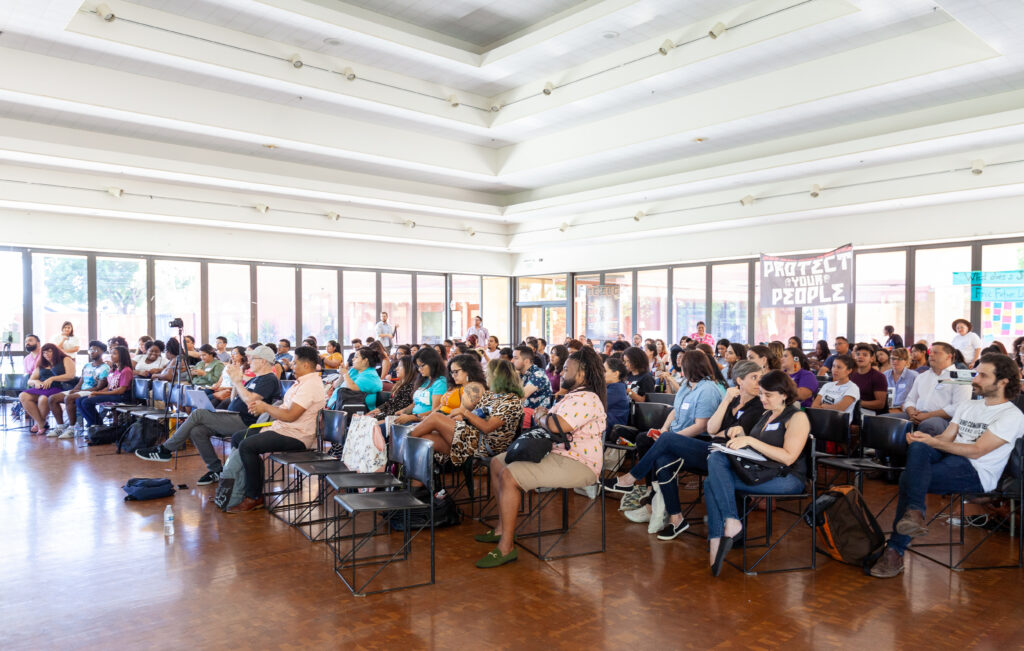
Picture – Take Back Tech 2019 – San José, CA
We are thrilled to report that this year’s gathering shattered records! Mijente and MediaJustice hosted 40 workshops with over 70 presenters, 4 plenary panels, and close to 450 participants. Folks participated from across 136 cities in the U.S. and 4 other countries ready to engage in authentic learning and unlearning.
Here’s what our time together looked like.
FRIDAY, Day 1:
We kicked things off with our first plenary panel of the weekend, “Genocide, Powered by Tech: What Palestine can teach us about technology.” featuring:
- Assia Boundaoui, an Algerian-American investigative journalist and filmmaker;
- Jumana Musa, a human rights attorney and racial justice activist,
- Mohammad Khatmi, an organizer with No Tech for Apartheid, and
- Mona Shtaya, Campaigns and Partnerships Manager (MENA) and Corporate Engagement Lead at Digital Action.
First, we discussed how Palestinians (and those standing with them in solidarity everywhere) are targeted with heightened surveillance. Too many face arrests and persecution simply for posting their dissent against apartheid on social media. Research by Palestinian organizations revealed an intense reality: two-thirds of young Palestinians feel unable to freely express political views online. They fear arrest under Israeli cybercrime laws – many of which are incredibly broad in scope.
Next, a major point of discussion came up around Israel’s role in creating and exporting invasive technologies like Pegasus spyware, which can be installed remotely on cell phones. Originally used to monitor Palestinians, this tech is similarly deployed against Mexican journalists investigating government corruption. This crossover highlighted the shared vulnerabilities across communities oppressed by state (and corporate) powers. It reinforced for all of us the importance of uplifting intersectional solidarity in our movements.
A powerful moment occurred when Mohammad Khatami emphasized the critical importance of worker power in the tech industry:
In the tech world, these technologies are first wielded against the workers. That’s why worker power is so, so, so crucial right now.
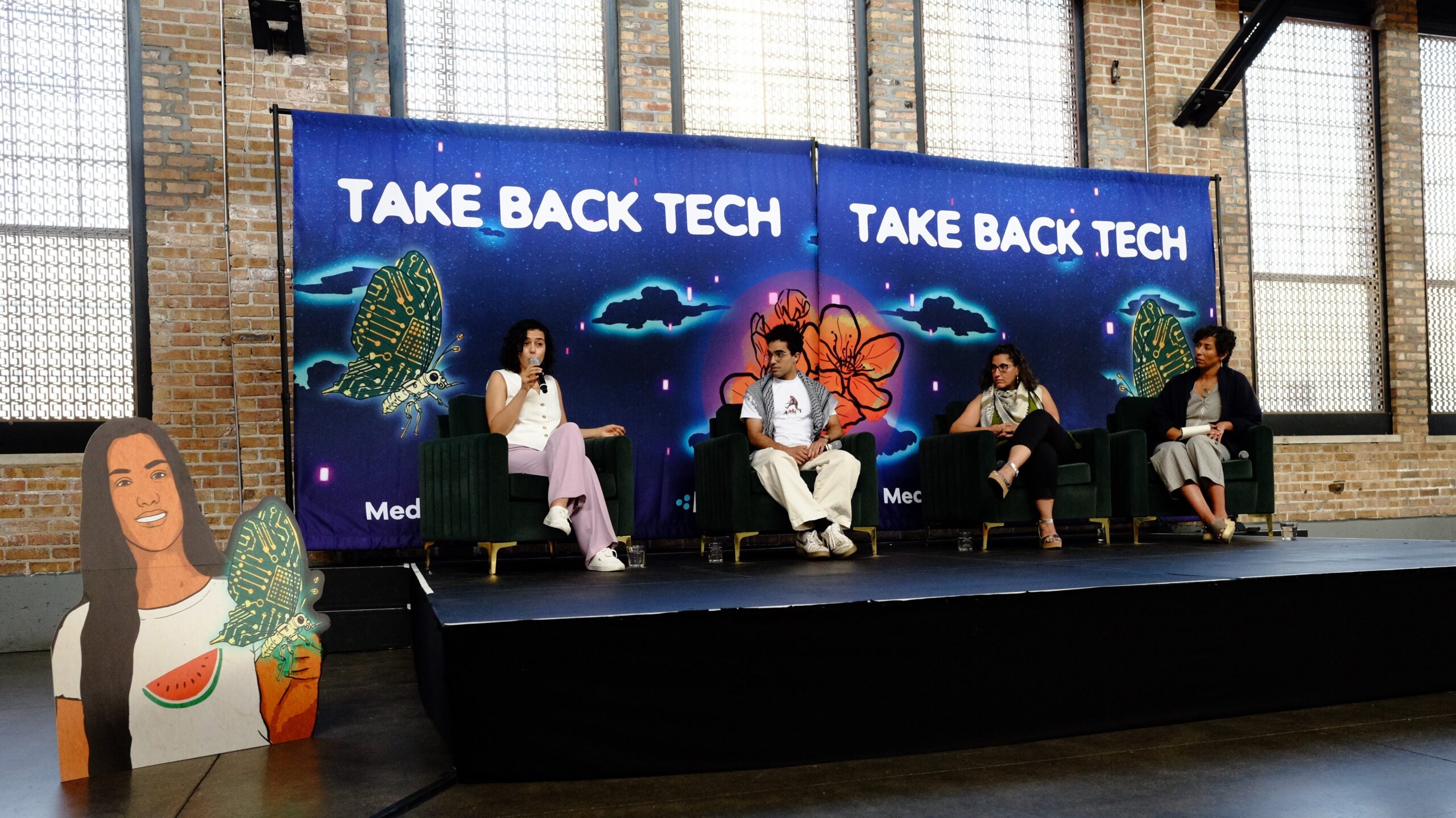
Picture – Take Back Tech 2024 – Chicago, IL
Workers Have the Power
Taking it further, Mohammad referenced the bold actions being organized and led by his former co-workers at Google. In the span of just a few months, they went from seeing one worker stand up in protest, to full-scale actions disrupting Google Next conferences. With many of these workers being fired as a result of standing up, Mohammad uplifted the role of tech workers. It’s critical that workers (like the organizers of No Tech For Apartheid) unite to resist the misuse of their labor.
Our opening panel sparked powerful conversations that really hit home the importance of putting people first in the tech world. Throughout the weekend, these ideas about combatting surveillance, leaning into strategic resistance, and joining forces ignited intense, meaningful discussions.
We closed our night with a simple but powerful reminder from Jumana Musa: It’s on us to lean into our power and “Disrupt, disrupt, disrupt.”
SATURDAY, Day 2:
On Saturday, we gathered at the Chicago Teachers’ Union for a full day of impactful discussions and workshops. The day started with our second panel, “Attack of the Killer Robots.“ This session tackled the widespread hype and hysteria around artificial intelligence, emphasizing the real-world impacts that often go ignored in mainstream media coverage. The panel featured:
- Bridget Todd from the “There Are No Girls on the Internet” podcast
- Harlan Yu, Director of Upturn
- Dr. Seeta Pena Gangadharan, an associate professor at LSE, and
- Tawana Petty, Executive Director of Petty Propolis.
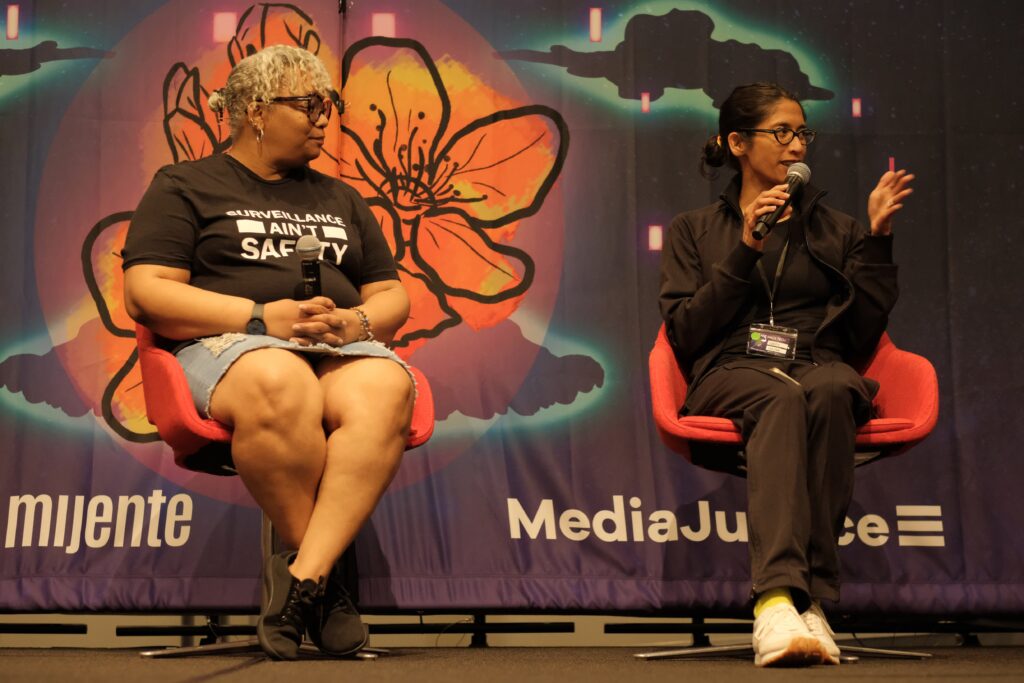
Picture – Take Back Tech 2024 – Chicago, IL
Harlan Yu began by highlighting how AI systems operate behind the scenes, affecting lives without most people realizing it. Like Yu shared: “A lot of these systems are working in the background in ways people don’t realize.
There’s a role for all of us, especially those who are experiencing these systems, to tell our stories, to make legible what AI is doing so we can take action to challenge and defeat it.
From police using AI to sift through cell phones to landlords utilizing algorithms to deny housing, the real-life consequences of AI are everywhere. Tawana Petty pointed out that much of the experimentation with AI is effectively being tested on the “laps and backs” of vulnerable communities. She emphasized the need for these communities to share their experiences and push back against these technologies.
Dr. Seeta Pena Gangadharan encouraged analyzing the application of AI in our own daily lives. We must challenge the marketing tactics of Big Tech and consider: “Why do I need this? Why do I need something that’s more complicated than it needs to be?” Instead, we can remind ourselves: “I need to do something face to face. I need to speak to a human. I need to actually relate to people, in an emotional sense.”
Lessons Learned
In the end, we recognized that current laws must evolve alongside these technologies. Governments need to be equipped with the know-how to ensure that everyone is protected from discrimination at the hands of AI. Bridget Todd grounded us with a reminder that there’s nothing new about the moment we’re in.
On the contrary, regardless of the non-stop marketing on the “new AI moment”, we’ve seen similar cycles of tech hype before. She stressed the importance of coming together with the clarity needed to move forward. We mustn’t be fazed by the idea that this is something we aren’t ready to confront. We are ready and must take action for a just tech future now.
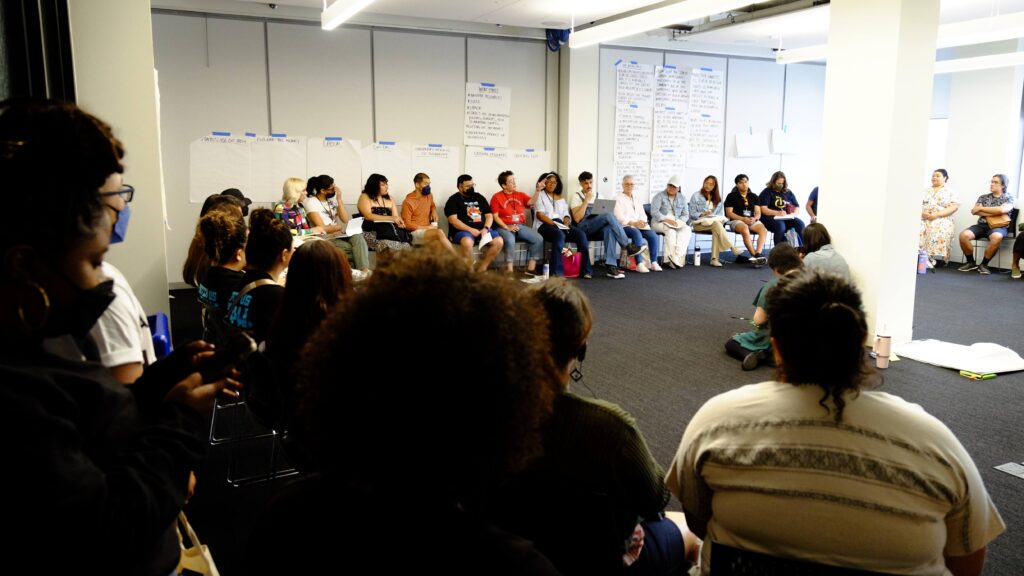
Picture – Take Back Tech 2024 – Chicago, IL
Patterns Workshops
Next, we kicked off our first Workshop Track: “Patterns”. Here, participants learned how the dark patterns of technology are used for social control, oppression and criminalization. We featured workshops like:
- “How Public Health data and crises like the COVID-19 pandemic expand the surveillance state” by the Stop LAPD Spying Coalition
- “People’s History of AI” by the Carceral Tech Resistance Network
- “The fight for reproductive freedom in the age of surveillance: a new collective vision” by Accountable Tech
During lunch participants enjoyed tasty dishes from Cafe Tlahuica and had the opportunity to browse and buy books from Haymarket Books, a radical, independent, nonprofit publisher from Chicago. Additionally, participants could screen print their own commemorative Take Back Tech poster (shoutout to Miguel over with Chicago-based Organized Communities Against Deportations!).
Seeds Workshops + Unconferencing Sessions
With everyone re-energized, we dove straight into our second Workshop Track, “Seeds“. This series touched on how communities are fighting back, creating change and sowing the seeds for liberated futures. We featured workshops like:
- “Fighting Surveillance in Schools” by Advancement Project and Puente Human Rights Movement
- “Data Brokers: What You and Policy Makers Can Do to Stop Them” by Just Futures Law
- “Fighting Worker Control at Amazon” by the Athena Coalition and the Missouri Workers Center.
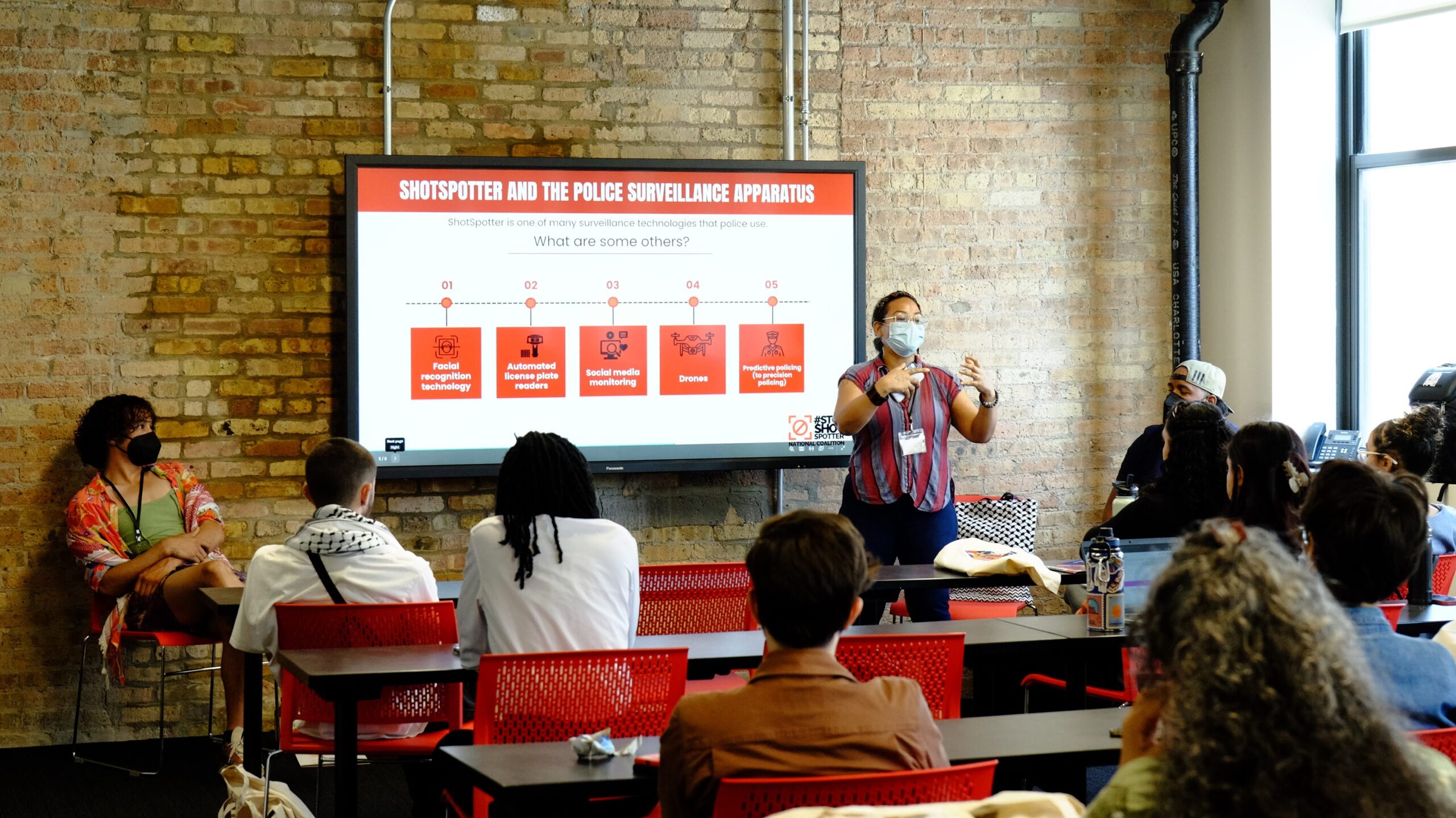
Picture – Take Back Tech 2024 – Chicago, IL
Lastly, we concluded the day with several “unconferencing sessions”. Here participants could reflect, share, and digest the day’s insights. Discussions covered a range of topics from the intersection of tech and Palestine to challenging the pipeline between academia and military research. The conversations provided opportunities for deeper understanding and strategizing.
And it didn’t quite end there. Because our movement is always rooted in the celebration of our people’s collective resilience in the face of oppression. So, we got together at Estereo in Chicago’s Fulton Market to dance, celebrate, and enjoy the night together. We’re building connections that last outside of conference spaces.
SUNDAY, Day 3:
Sunday marked the concluding day of our transformative weekend, and it was nothing short of inspiring. First, we commenced with the “Here, There, and Everywhere” plenary panel, featuring:
- Alex Hanna, Director of Research at the Distributed AI Research Institute
- Dhaksh Sooriya, a civil engineer and PhD student
- Paula Guerra Cáceres, former president of SOS Racismo Madrid
- Paz Peña, independent researcher and author of “Technologies for a burning planet”
This panel underscored the global nature of the struggle to reclaim technology, highlighting the unique and shared challenges faced by communities worldwide. First, panelists drew attention to how tech-driven initiatives exacerbate environmental damages in regions like Latin America and Africa and how technology fortifies social and racial disparities and aids authoritarian agendas.
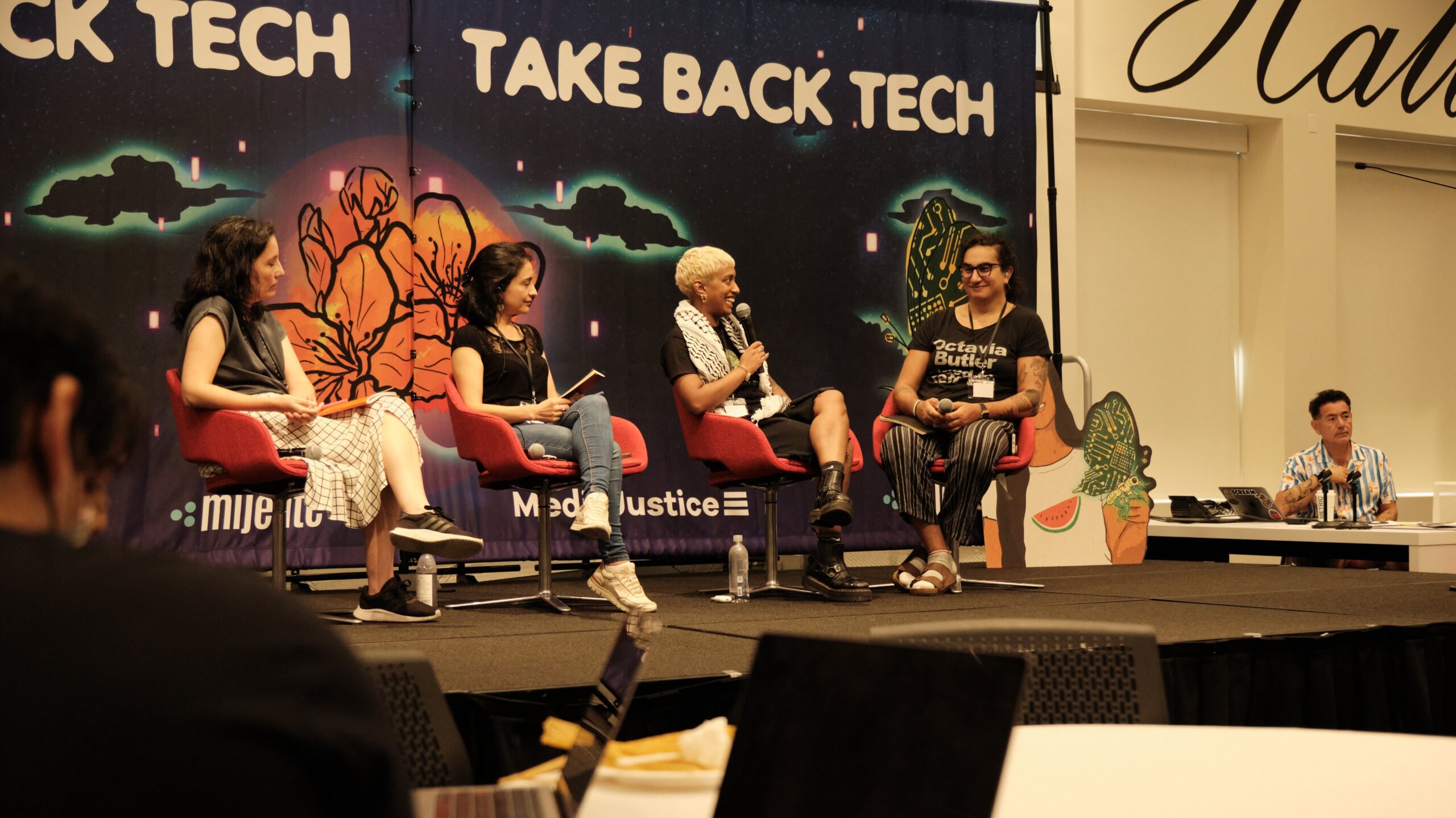
Picture – Take Back Tech 2024 – Chicago, IL
Second, Paula Guerra Cáceres revealed how this technology hurts immigrant communities trying to settle into new countries. As one example, she told the story of a journalist who tested a new “virtual policing” system at an airport. Though she answered the questions honestly, she was wrongly flagged by the system as committing fraud.
Lastly, we learned that though AI technology has huge impacts on people’s lives, it isn’t always fair or just. Instead, AI can be dangerously incorrect when granted the ability to make those choices. Dhaksh Sooriya wrapped up our panel with a powerful reminder:
The first step to resistance is understanding what we’re up against.
Skills Workshops
Our last workshop track “Skills”, featured a variety of workshops to empower participants drive change through culture, art, and storytelling. We featured workshops like:
- “Transnational Tech and Repression, Our Movements for Justice” by Equality Labs
- “Anatomy of a Fight for the Future Campaign: Tools, Tricks, and Tactics” by Fight for the Future
- “The Power of Art and Storytelling to Combat e-Carceration” by Pueblos de Lucha y Esperanza, St. Louis Interfaith Committee on Latin America, and Migrantes Unidos.
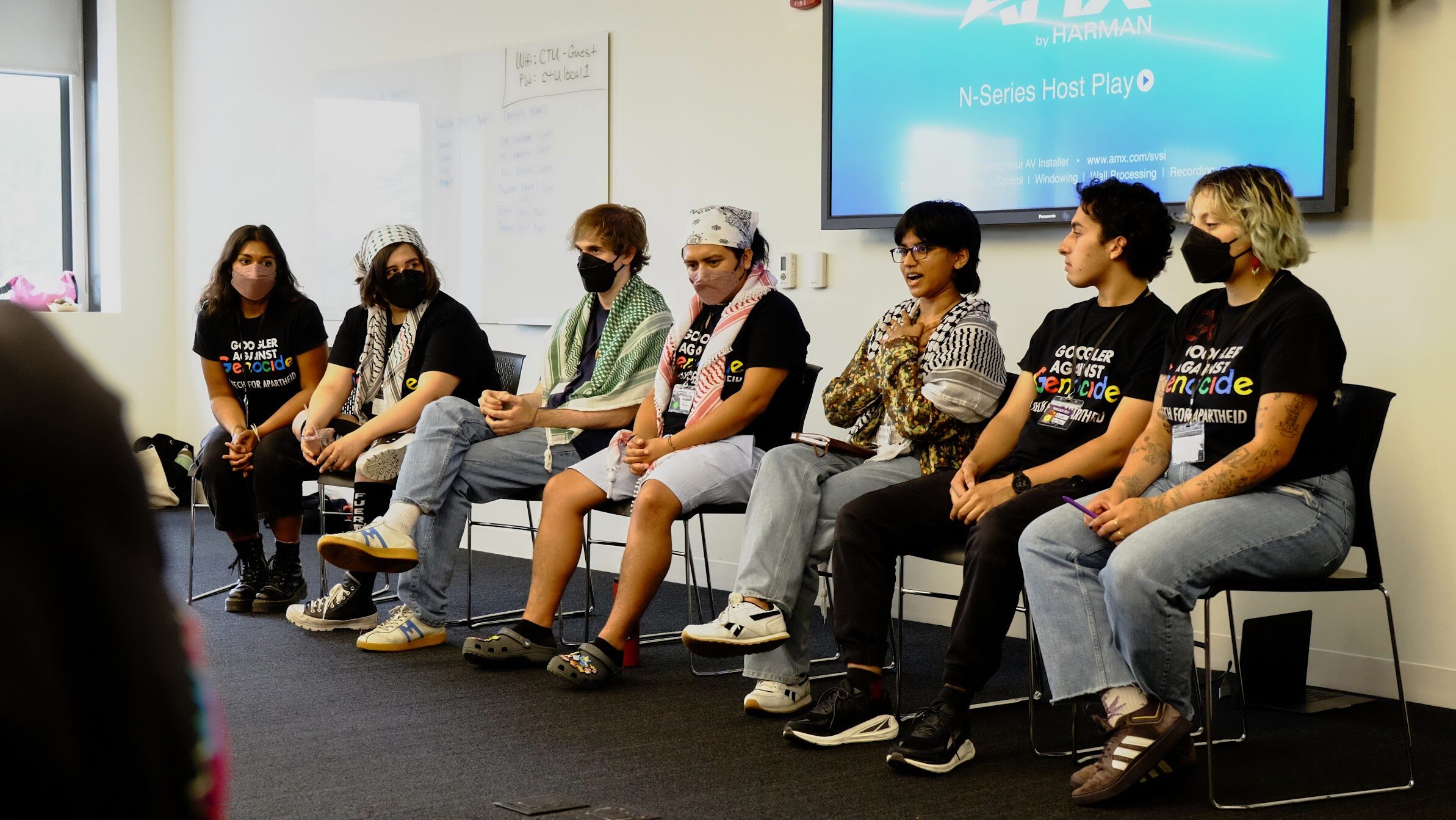
Picture – Take Back Tech 2024 – Chicago, IL
Our final plenary panel of the weekend, “Resisting Borders and Technologies of Violence: Imagination towards Liberation,“ featured an engaging lineup:
- Ruha Benjamin, founding Director of the Ida B. Wells Just Data Lab
- Mizue Aizeki, founder and Executive Director of Surveillance Resistance Lab
- Jacinta Gonzalez, Mijente’s own Policy Director and #NoTechforICE campaign lead
They had a few topics of focus: How do we understand borders and the rising border technology? What are the impacts of tech and surveillance on migration? What can history teach us about how innovations can be used to harm and control? They tackled some big questions, indeed.
Ruha Benjamin led an interactive exercise to help paint the picture the kind of future we want. A future where everyone can thrive and about what’s really possible, even when we’re told over and over again that it isn’t. She shared: “Boldness is rationed while ‘realness’ is mass-produced.” Additionally, Benjamin warned us not to let futurists shape what we think is possible, while they themselves use their imaginations to craft ways to harm and exploit our communities.
Exposing Exploitation + Widening Imaginations
Jacinta Gonzalez reflected on the early days of the #Not1MoreDeportation Campaign. Mobile fingerprinting devices used by ICE during raids of homes, businesses, and prayer groups were the same as those used in Afghanistan and Iraq. The same tech, repurposed for more exploitation.
Similarly, she highlighted the “Automating Deportation” study (by Mijente & Just Futures Law) that examines US government use of AI. The report examines how AI is now being used by the Department of Homeland Security (DHS) to make screening and decision-making processes at the border more automated. It can’t be overstated: AI tech’s impact on immigrant communities is expanding harms.
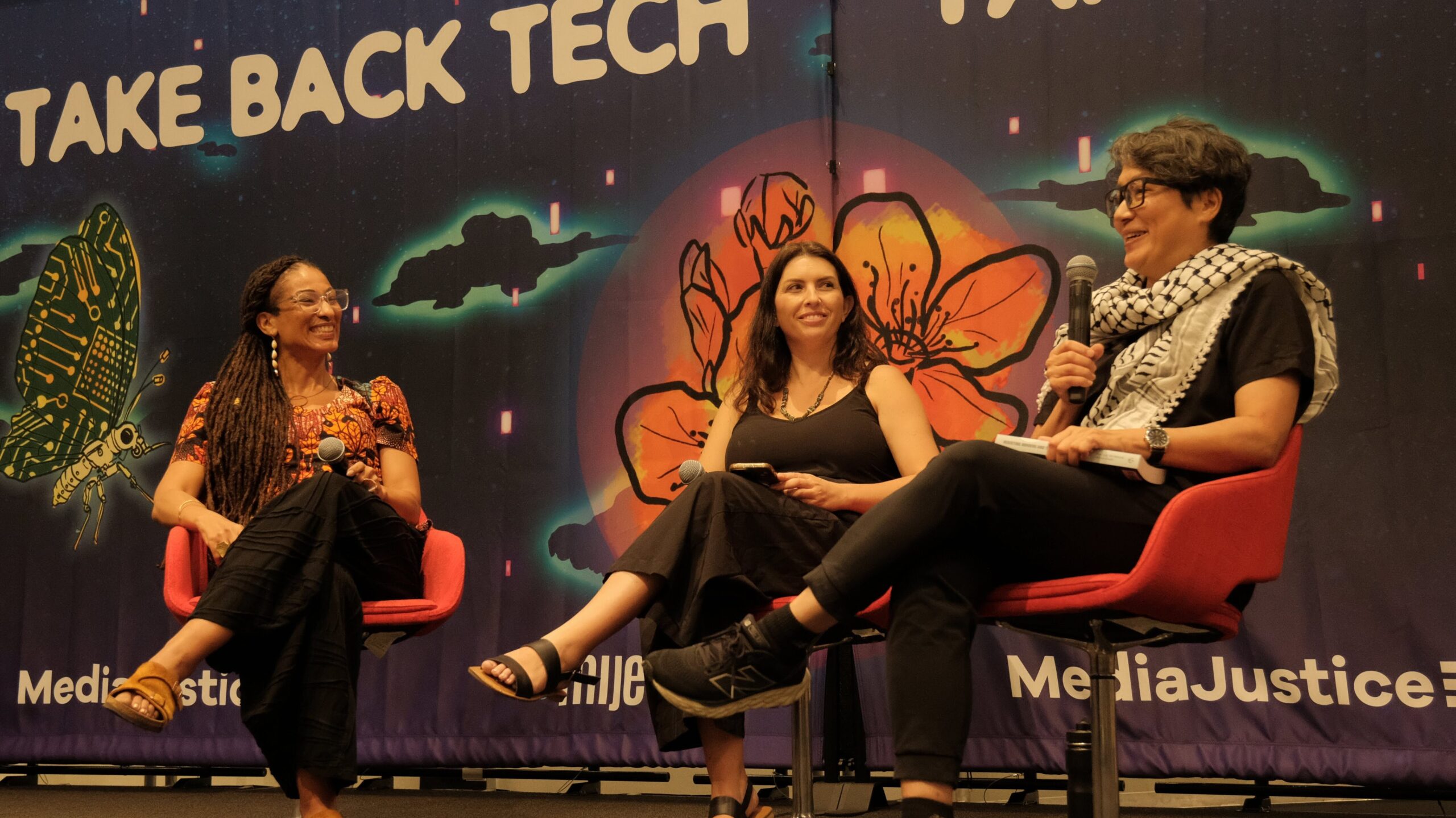
Picture – Take Back Tech 2024 – Chicago, IL
Mizue set the scene for the urgency of the moment that we’re in and exactly what we’re up against. “In thinking about tech in this moment,” she shared, “we are confronted by the ascendancy of one of the oldest paradigm of depriving rights, whether it’s xenophobia, racism, or superiority.”
These topics are the core focus of her recent anthology, Resisting Borders and Technologies of Violence, a collection of essays “bringing together scholarship alongside organizing, there are case studies putting the EU and the United States in conversation as the two major colonial imperial, racial, capitalist powers who are both extremely invested in migration control and bordering.”
Ruha summed up the weekend by emphasizing the need for collective effort in shaping the future: “We need all hands on deck,” she said to the crowd of hundreds of organizers, academics, tech workers, and young students. “We need practical discussions about policy and legislation, but we also need bold, visionary thinking about the world we want to live in.”
Unbound Organizational Bookfair
Before wrapping things up, we co-hosted the Unbound organizational bookfair with Haymarket Books. Here participants could browse and buy books related to the topics explored during Take Back Tech. We even had a special guest appearance from La Chismosa, Mijente’s very own decked out RV! It’s promoting our El Chisme 2024 Tour, that’s reaching over 15 cities and Puerto Rico to keep our gente up to date on the latest political chisme and celebrate our cultura while we’re at it.
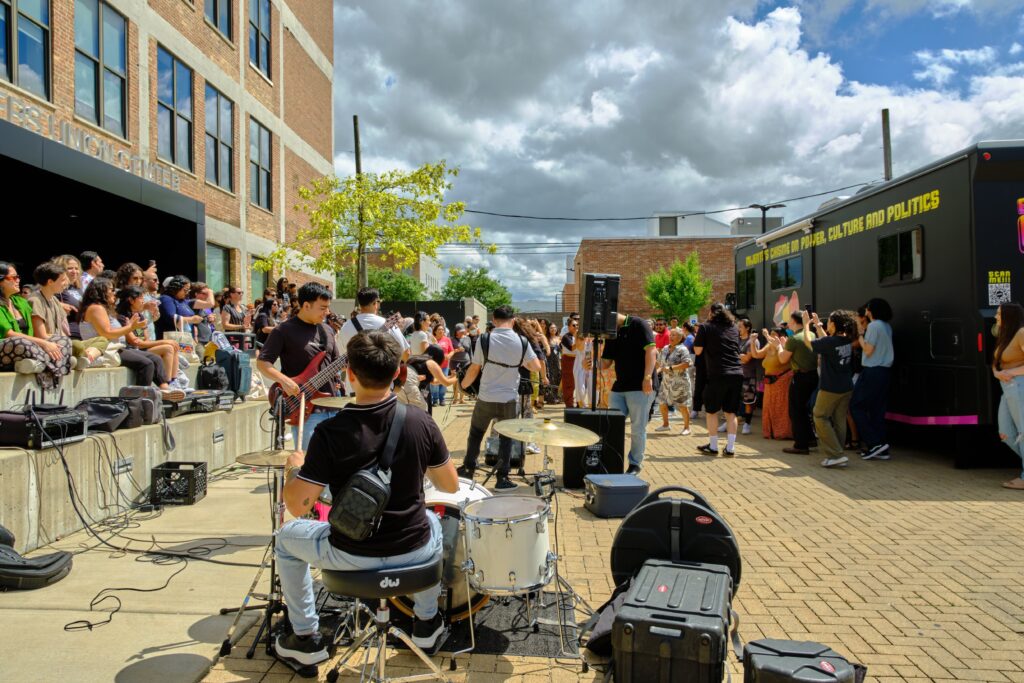
Picture – Take Back Tech 2024 – Chicago, IL
A Convening to Remember
We ended Take Back Tech together with more dancing and celebration, building off of the connections forged together over the weekend. As we saw our gente express their joy and show off their moves, one thing was clear: Take Back Tech was nothing like your typical tech conference. It was a space where we celebrated culture, solidarity, and critical discussions often marginalized (if not outright silenced) in mainstream tech spaces.
We’re thankful to everyone who contributed to making this weekend so powerful and are ready to carry this new energy forward as we continue to challenge and reshape the landscape of technology for our gente.
This work is part of our intergenerational solidarity – what we owe not just our kids, but future generations of kids.
Ruha Benjamin